夏休み経済教室 2日目:Summertime Economic Seminar Day 2 [Report]
「先生のための夏休み経済教室」@東京(2日目:8/12)
"Summertime Economic Seminar for Teachers" @Tokyo (Day2: 8/12)
場所:東京証券取引所・東証ホール; Place: Tokyo Stock Exchange, Tosho Hall
参加者:中高校教員約100名; Participants: About 100 middle/high school teachers
プログラム: Program:
10:20-10:30 新井明氏(Akira Arai)による「最後通牒ゲーム」(Ultimatum Game)の実施
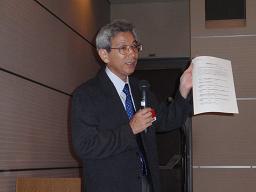
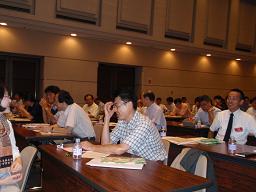
10:30-12:10 「国際経済」 (Int'l Economics):13:20-15:10 「基本・ミクロ経済」(Micro)
講師:篠原総一氏(Soichi Shinohara)および倉澤資成氏(Motonari Kurasawa)
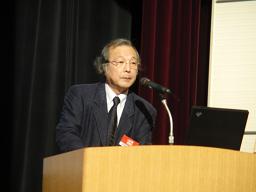
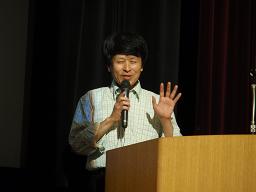
15::20-17:00 シンポ「経済学をどう授業に取り入れるか」(How to Utilize Economics)
パネリスト:新井氏(Arai)、赤峰氏(Akamine)、篠原氏(Shinohara)、倉澤氏(Kurasawa)
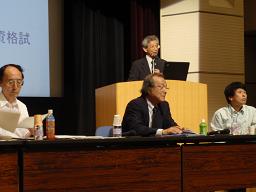
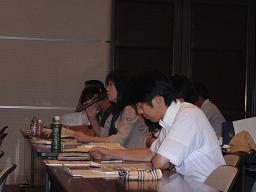
先生のための「夏休み経済教室」(2日目)内容要旨:
8月12日に東証ホールで「中高校教員のための経済教室」の2日目が開催された。
まず総合司会の新井明氏(都立西高)が、簡単な開会の挨拶の後に、参加者全員にペアーを組ませて「最後通牒ゲーム」を実施した。これはクラスでもすぐ準備なしにできるゲームとして紹介された。
セッション1(10:30-12:10)では、篠原総一氏(同志社大)が「国際経済」に関するプレゼンを行い、特にリカードの「比較生産費説」を中学生でさえも理解できるほど簡単にした説明を試みた。そこで重要なのは、「絶対優位」ではなく「比較優位」という概念で、それが貿易のパターンを決めること、また日本が軽工業から自動車やハイテク産業に転換したように「比較優位」は時間とともに変化することに注意する必要があると篠原氏は指摘。
続いてセッション2(13:20-15:10)では、倉澤資成氏(横浜国大)が「基本問題とミクロ経済」について講演し、合理的行動、選択と(機会)費用、時間の効率的配分、需要と供給といった基本的概念を取り上げた。これらの鍵となる概念を学びさえすれば経済学に対する理解が飛躍的に高まると倉澤氏は強調した。
シンポジウム(15:30-17:00)では4人のパネリスト(新井氏、赤峰氏、篠原氏、倉澤氏)が「経済を教えるのに経済学をどう役立てるか」について議論した。まずそれぞれのパネリストが以下のような考え方を提示:(1)経済のシステムや組織や政策についてその名前や出来事を単に記憶することよりも、それらの基本的な役割やメカニズムを理解することに重点を置くべき、(2)生徒に経済的な考え方を身に付けさせて、社会経済問題について自ら考えさせるようにすべき、(3)市場のメカニズムを、自分たちの生活に影響するものとして理解を深め、現実的には市場の失敗とともに政府の失敗があることを学ぶべき。
その後、パネリストは参加者からの質問を取り上げたが、モラルと経済学の問題、市場での勝ち組と負け組、グローバル化の長所と短所など様々な問題が投げかけられた。
最後に、篠原氏が経済教育ネットワーク代表として、この2日間のセミナーを振り返って、この活動は今後も続けていくつもりであること、また次回はカバーするテーマの順番や内容を改善し(「金融」を加えるなど)、また中学の先生と高校の先生の異なったニーズにそれぞれ対応するように工夫したいと述べてシンポジウムを締めくくった。
いずれにしても、経済教育ネットワークが東京証券取引所グループと協力して実施したこの2日間のセミナーは、色々な課題があったものの、現場でよりよい経済教育を行いたいと願う先生方のために役立つ試みであったと思われる。
Summertime Economic Seminar for Teachers (Day 2) Summary:
On the second day of the seminar (8/12), after his brief introductory remarks, Mr. Akira Arai (Toritsu Nishi High) first had all the participants play the “ultimatum game.”
In Session 1 (10:30-12:10), Mr. Soichi Shinohara (Doshisha University) made a presentation in "International Economics," where he explained Ricardian “comparative cost theory” in such a simple way that even middle school students can understand it. An important concept is “comparative” advantage rather than “absolute advantage,” which determines the pattern of trade, and it should be noted that “comparative” advantage tends to change over time, e.g., from light industries to auto and high-tech industries in the case of Japan, according to Mr. Shinohara.
In Session 2 (13:20-15:10), Mr. Motonari Kurasawa (Yokohama National University) gave a talk on “Fundamental Problems and Microeconomics,” where he highlighted such basic concepts as rational behavior, choice and (opportunity) cost, efficiency in time allocation, supply and demand, etc. One can go a long way toward the understanding of economics by just learning these few key concepts.
In the Symposium (15:30-17:00), four panelists (Mr. Arai, Mr. Akamine, Mr. Shinohara and Mr. Kurasawa) discussed how to utilize economics in teaching economic subjects in class, first by expressing their opinions as follows: (1) more emphasis should be placed on the explanation of the basic role and mechanism of economic systems, institutions and policies, rather than memorization of those names and events, (2) students should be encouraged to learn the economic way of thinking and to comprehend and analyze economic and social events on their own, and (3) we all should have a better understanding of market mechanism, affecting our daily life, and the failures of markets as well as governments in reality.
Then, the panelists responded to various questions from the audience regarding moral and economics, winners and losers in competition, merits and demerits of globalization, etc.
Finally, Mr. Shinohara, representing NEE (Network of Economic Education) concluded by reflecting on the two-day seminar that this kind of activities should be continued, but next time more consideration would be given to the order and content of subjects to be covered (including "finance" in the future) , and to meet the needs of middle-school teachers and of high-school teachers separately.
At any rate, it was a good try on the part of NEE in cooperation with the Tokyo Stock Exchange group for the benefit of teachers who are eager to learn economics for more effective teaching practices in class.
"Summertime Economic Seminar for Teachers" @Tokyo (Day2: 8/12)
場所:東京証券取引所・東証ホール; Place: Tokyo Stock Exchange, Tosho Hall
参加者:中高校教員約100名; Participants: About 100 middle/high school teachers
プログラム: Program:
10:20-10:30 新井明氏(Akira Arai)による「最後通牒ゲーム」(Ultimatum Game)の実施
10:30-12:10 「国際経済」 (Int'l Economics):13:20-15:10 「基本・ミクロ経済」(Micro)
講師:篠原総一氏(Soichi Shinohara)および倉澤資成氏(Motonari Kurasawa)
15::20-17:00 シンポ「経済学をどう授業に取り入れるか」(How to Utilize Economics)
パネリスト:新井氏(Arai)、赤峰氏(Akamine)、篠原氏(Shinohara)、倉澤氏(Kurasawa)
先生のための「夏休み経済教室」(2日目)内容要旨:
8月12日に東証ホールで「中高校教員のための経済教室」の2日目が開催された。
まず総合司会の新井明氏(都立西高)が、簡単な開会の挨拶の後に、参加者全員にペアーを組ませて「最後通牒ゲーム」を実施した。これはクラスでもすぐ準備なしにできるゲームとして紹介された。
セッション1(10:30-12:10)では、篠原総一氏(同志社大)が「国際経済」に関するプレゼンを行い、特にリカードの「比較生産費説」を中学生でさえも理解できるほど簡単にした説明を試みた。そこで重要なのは、「絶対優位」ではなく「比較優位」という概念で、それが貿易のパターンを決めること、また日本が軽工業から自動車やハイテク産業に転換したように「比較優位」は時間とともに変化することに注意する必要があると篠原氏は指摘。
続いてセッション2(13:20-15:10)では、倉澤資成氏(横浜国大)が「基本問題とミクロ経済」について講演し、合理的行動、選択と(機会)費用、時間の効率的配分、需要と供給といった基本的概念を取り上げた。これらの鍵となる概念を学びさえすれば経済学に対する理解が飛躍的に高まると倉澤氏は強調した。
シンポジウム(15:30-17:00)では4人のパネリスト(新井氏、赤峰氏、篠原氏、倉澤氏)が「経済を教えるのに経済学をどう役立てるか」について議論した。まずそれぞれのパネリストが以下のような考え方を提示:(1)経済のシステムや組織や政策についてその名前や出来事を単に記憶することよりも、それらの基本的な役割やメカニズムを理解することに重点を置くべき、(2)生徒に経済的な考え方を身に付けさせて、社会経済問題について自ら考えさせるようにすべき、(3)市場のメカニズムを、自分たちの生活に影響するものとして理解を深め、現実的には市場の失敗とともに政府の失敗があることを学ぶべき。
その後、パネリストは参加者からの質問を取り上げたが、モラルと経済学の問題、市場での勝ち組と負け組、グローバル化の長所と短所など様々な問題が投げかけられた。
最後に、篠原氏が経済教育ネットワーク代表として、この2日間のセミナーを振り返って、この活動は今後も続けていくつもりであること、また次回はカバーするテーマの順番や内容を改善し(「金融」を加えるなど)、また中学の先生と高校の先生の異なったニーズにそれぞれ対応するように工夫したいと述べてシンポジウムを締めくくった。
いずれにしても、経済教育ネットワークが東京証券取引所グループと協力して実施したこの2日間のセミナーは、色々な課題があったものの、現場でよりよい経済教育を行いたいと願う先生方のために役立つ試みであったと思われる。
Summertime Economic Seminar for Teachers (Day 2) Summary:
On the second day of the seminar (8/12), after his brief introductory remarks, Mr. Akira Arai (Toritsu Nishi High) first had all the participants play the “ultimatum game.”
In Session 1 (10:30-12:10), Mr. Soichi Shinohara (Doshisha University) made a presentation in "International Economics," where he explained Ricardian “comparative cost theory” in such a simple way that even middle school students can understand it. An important concept is “comparative” advantage rather than “absolute advantage,” which determines the pattern of trade, and it should be noted that “comparative” advantage tends to change over time, e.g., from light industries to auto and high-tech industries in the case of Japan, according to Mr. Shinohara.
In Session 2 (13:20-15:10), Mr. Motonari Kurasawa (Yokohama National University) gave a talk on “Fundamental Problems and Microeconomics,” where he highlighted such basic concepts as rational behavior, choice and (opportunity) cost, efficiency in time allocation, supply and demand, etc. One can go a long way toward the understanding of economics by just learning these few key concepts.
In the Symposium (15:30-17:00), four panelists (Mr. Arai, Mr. Akamine, Mr. Shinohara and Mr. Kurasawa) discussed how to utilize economics in teaching economic subjects in class, first by expressing their opinions as follows: (1) more emphasis should be placed on the explanation of the basic role and mechanism of economic systems, institutions and policies, rather than memorization of those names and events, (2) students should be encouraged to learn the economic way of thinking and to comprehend and analyze economic and social events on their own, and (3) we all should have a better understanding of market mechanism, affecting our daily life, and the failures of markets as well as governments in reality.
Then, the panelists responded to various questions from the audience regarding moral and economics, winners and losers in competition, merits and demerits of globalization, etc.
Finally, Mr. Shinohara, representing NEE (Network of Economic Education) concluded by reflecting on the two-day seminar that this kind of activities should be continued, but next time more consideration would be given to the order and content of subjects to be covered (including "finance" in the future) , and to meet the needs of middle-school teachers and of high-school teachers separately.
At any rate, it was a good try on the part of NEE in cooperation with the Tokyo Stock Exchange group for the benefit of teachers who are eager to learn economics for more effective teaching practices in class.
先生のための夏休み経済教室:Summertime Economic Seminar for Teachers [Report]
「先生のための夏休み経済教室」が東京で開催(1日目:8/11)
"Summertime Economic Seminar for Teachers" @Tokyo (Day1: 8/11)
場所:東京証券取引所・東証ホール; Place: Tokyo Stock Exchange, Tosho Hall
参加者:中高校の教員100名以上; Participants: More than 100 teachers
プログラム: Program:
10:20-10:30 東証からの挨拶と新井明氏(司会): Greetings & Moderator (Akira Arai)
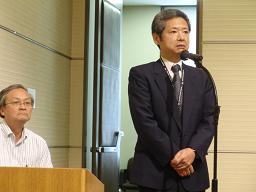
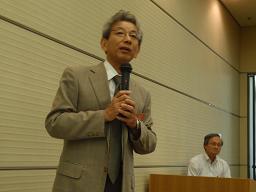
セッション1:医療・年金と経済:Economics of Medical Care & Public Pension
10:30-12:30 西村周三氏(Shuzo Nishimura)と質疑の様子(Participants)
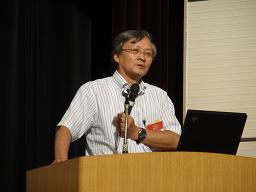
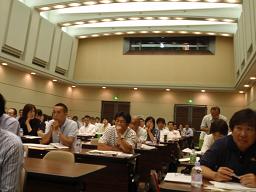
セッション2:政治経済と財政問題:Political Economy of Fiscal Problems
13:20-15:20 中川雅之氏(Masayuki Nakagawa)と質疑の様子(Participants)
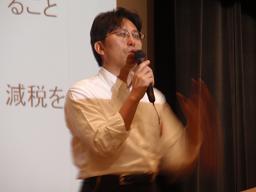
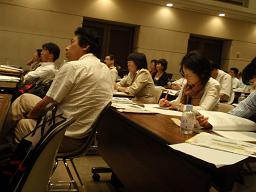
セッション3:日本経済シミュレーションゲーム(Simulation Game of Japan's Economy)
15:30-17:00 シミュレーションゲームの実践(Game Exercise for Participants)
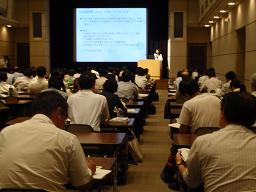
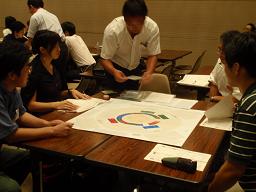
NHKテレビインタビューと1日目閉会:NHK TV Interview & Closing Remarks for Day 1
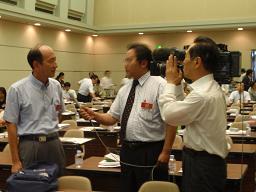
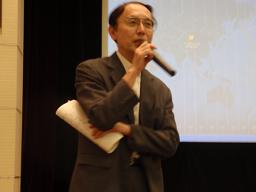
先生のための「夏休み経済教室」(1日目)内容要旨:
経済教育ネットワークは、東京証券取引所グループと協力して、8月11日と12日の2日にわたり東京の東証ホールで、中高校教員のための経済教室を開催した。まず1日目の冒頭で、東証グループの代表と総合司会の新井明氏(都立西高)が開会の挨拶を行った。
セッション1(10:30-12:30)では、西村周三氏(京都大)が「医療・年金と経済」について講演し、そこで医療費の分配面で、支払額の大半が医者や看護師やその他医療部門のスタッフの人件費として支払われることを説明。したがって、医療費の過度の抑制は、医療に携わる人の数と質にマイナスの影響を及ぼすことを指摘した。また年金については、賦課方式と積立方式のどちらがいいかは、人口減少率や経済成長率など多くの要因に依存すると述べて、そのように経済学では明確な答えが見出せない場合が多々あることを強調した。
次にセッション2(13:20-15:20)では、中川雅之氏(日大)が「政治・経済における財政問題」について講義し、まず「プライマリー・バランス」の概念を説明して、長期的に政府の財政に対する信頼を維持するためにプライマリー・バランスを回復することが重要と述べた。さらに政府支出の乗数効果を取り上げ、その乗数の大きさは消費者が近視眼的かそれとも将来の増税を予測しているかどうかに依存することを指摘した。
それに続くセッション3(15:30-17:00)では、東京証券取引所グループが「日本経済シミュレーションゲーム」を、すべての参加者を巻き込んで実施した。ゲームそのものは、中学3年生から高校生を対象に開発されたもので、経済の資金循環や政府の財政などを理解させることが目的。
最後に、篠原総一氏(同志社大)が、経済教育ネットワーク代表として閉会前の挨拶を行った。
1日目の印象ないし感想として、(1)講演の内容が高校レベルとしては適切だったかもしれないが、中学レベルとしては必ずしもそうでないこと、(2)社会保障や財政のような応用分野のトピックスを取り上げる前に、もっと基礎的なミクロやマクロ経済学をカバーすべきこと、そして(3)シミュレーションゲームはもっと簡単化し、時間をあまり取らないようにして、もっとゲームとしての面白さを加えるべきことなどが指摘できるのではないだろうか。
東京での「夏休み経済教室」の2日間のプログラムの詳細は以下を参照:
http://www.econ-edu.net/modules/tinyd3/index.php?id=31
Summertime Economic Seminar for Teachers (Day 1) Summary:
The Network for Economic Education, in cooperation with Tokyo Stock Exchange (TSE), held a two-day seminar in economics for middle/high school teachers at TSE's Tosho Hall in Tokyo on August 11-12. On the first day of the seminar, opening remarks were given by a representative of the TSE group and also by Mr. Akira Arai (Toritsu Nishi High) as the moderator.
In Session 1 (10:30-12:30), Mr. Shuzo Nishimura (Kyoto University) gave a talk on "Economics of Medical Care and Public Pension," where he emphasized the distribution side of medical expenditures that are received in large part by doctors, nurses and other personnel in the medical sector, implying that excessively suppressed medical costs would have negative consequences on the number and quality of medical personnel. Regarding Japan's public pension system, our choice between the pay-as-you-go system (fuka-hoshiki) and the reserve fund system (tsumitate-hoshiki) should depend on various factors, especially on the rates of population decline and economics growth, giving a lesson that we cannot often find unambiguous answers in economics.
In Session 2 (13:20-15:20), Mr. Masayuki Nakagawa (Nihon University) made a presentation on "Political Economy of Fiscal Problems," where the definition and meaning of the concept of "primary balance," which should be restored to maintain public confidence in the government's fiscal management in the long run. Also examined was the multiplier effect of fiscal spending, which will depend on whether consumers are myopic or anticipating future tax increases.
In Session 3 (15:30-17:00), a simulation game of the Japanese economy was conducted by the Tokyo Stock Exchange group, involving all the participants, where the game itself is intended mainly for high school students and possibly third-year middle school students to understand the money flow and public financing.
Finally, closing remarks were given by Mr. Soichi Shinohara (Doshisha University).
General impressions and comments for the first day are that (1) the presentations were appropriate for teaching at the high school level, but not necessarily at the middle school level, (2) more basic micro and macro economics subjects should be covered before applied topics such as social security and fiscal policy issues are taken up, and (3) the simulation game should be made a little simpler and less time-consuming with more fun as a game.
For the 2-day program of the Summertime Economic Seminar in Tokyo, see the following:
http://www.econ-edu.net/modules/tinyd3/index.php?id=31
"Summertime Economic Seminar for Teachers" @Tokyo (Day1: 8/11)
場所:東京証券取引所・東証ホール; Place: Tokyo Stock Exchange, Tosho Hall
参加者:中高校の教員100名以上; Participants: More than 100 teachers
プログラム: Program:
10:20-10:30 東証からの挨拶と新井明氏(司会): Greetings & Moderator (Akira Arai)
セッション1:医療・年金と経済:Economics of Medical Care & Public Pension
10:30-12:30 西村周三氏(Shuzo Nishimura)と質疑の様子(Participants)
セッション2:政治経済と財政問題:Political Economy of Fiscal Problems
13:20-15:20 中川雅之氏(Masayuki Nakagawa)と質疑の様子(Participants)
セッション3:日本経済シミュレーションゲーム(Simulation Game of Japan's Economy)
15:30-17:00 シミュレーションゲームの実践(Game Exercise for Participants)
NHKテレビインタビューと1日目閉会:NHK TV Interview & Closing Remarks for Day 1
先生のための「夏休み経済教室」(1日目)内容要旨:
経済教育ネットワークは、東京証券取引所グループと協力して、8月11日と12日の2日にわたり東京の東証ホールで、中高校教員のための経済教室を開催した。まず1日目の冒頭で、東証グループの代表と総合司会の新井明氏(都立西高)が開会の挨拶を行った。
セッション1(10:30-12:30)では、西村周三氏(京都大)が「医療・年金と経済」について講演し、そこで医療費の分配面で、支払額の大半が医者や看護師やその他医療部門のスタッフの人件費として支払われることを説明。したがって、医療費の過度の抑制は、医療に携わる人の数と質にマイナスの影響を及ぼすことを指摘した。また年金については、賦課方式と積立方式のどちらがいいかは、人口減少率や経済成長率など多くの要因に依存すると述べて、そのように経済学では明確な答えが見出せない場合が多々あることを強調した。
次にセッション2(13:20-15:20)では、中川雅之氏(日大)が「政治・経済における財政問題」について講義し、まず「プライマリー・バランス」の概念を説明して、長期的に政府の財政に対する信頼を維持するためにプライマリー・バランスを回復することが重要と述べた。さらに政府支出の乗数効果を取り上げ、その乗数の大きさは消費者が近視眼的かそれとも将来の増税を予測しているかどうかに依存することを指摘した。
それに続くセッション3(15:30-17:00)では、東京証券取引所グループが「日本経済シミュレーションゲーム」を、すべての参加者を巻き込んで実施した。ゲームそのものは、中学3年生から高校生を対象に開発されたもので、経済の資金循環や政府の財政などを理解させることが目的。
最後に、篠原総一氏(同志社大)が、経済教育ネットワーク代表として閉会前の挨拶を行った。
1日目の印象ないし感想として、(1)講演の内容が高校レベルとしては適切だったかもしれないが、中学レベルとしては必ずしもそうでないこと、(2)社会保障や財政のような応用分野のトピックスを取り上げる前に、もっと基礎的なミクロやマクロ経済学をカバーすべきこと、そして(3)シミュレーションゲームはもっと簡単化し、時間をあまり取らないようにして、もっとゲームとしての面白さを加えるべきことなどが指摘できるのではないだろうか。
東京での「夏休み経済教室」の2日間のプログラムの詳細は以下を参照:
http://www.econ-edu.net/modules/tinyd3/index.php?id=31
Summertime Economic Seminar for Teachers (Day 1) Summary:
The Network for Economic Education, in cooperation with Tokyo Stock Exchange (TSE), held a two-day seminar in economics for middle/high school teachers at TSE's Tosho Hall in Tokyo on August 11-12. On the first day of the seminar, opening remarks were given by a representative of the TSE group and also by Mr. Akira Arai (Toritsu Nishi High) as the moderator.
In Session 1 (10:30-12:30), Mr. Shuzo Nishimura (Kyoto University) gave a talk on "Economics of Medical Care and Public Pension," where he emphasized the distribution side of medical expenditures that are received in large part by doctors, nurses and other personnel in the medical sector, implying that excessively suppressed medical costs would have negative consequences on the number and quality of medical personnel. Regarding Japan's public pension system, our choice between the pay-as-you-go system (fuka-hoshiki) and the reserve fund system (tsumitate-hoshiki) should depend on various factors, especially on the rates of population decline and economics growth, giving a lesson that we cannot often find unambiguous answers in economics.
In Session 2 (13:20-15:20), Mr. Masayuki Nakagawa (Nihon University) made a presentation on "Political Economy of Fiscal Problems," where the definition and meaning of the concept of "primary balance," which should be restored to maintain public confidence in the government's fiscal management in the long run. Also examined was the multiplier effect of fiscal spending, which will depend on whether consumers are myopic or anticipating future tax increases.
In Session 3 (15:30-17:00), a simulation game of the Japanese economy was conducted by the Tokyo Stock Exchange group, involving all the participants, where the game itself is intended mainly for high school students and possibly third-year middle school students to understand the money flow and public financing.
Finally, closing remarks were given by Mr. Soichi Shinohara (Doshisha University).
General impressions and comments for the first day are that (1) the presentations were appropriate for teaching at the high school level, but not necessarily at the middle school level, (2) more basic micro and macro economics subjects should be covered before applied topics such as social security and fiscal policy issues are taken up, and (3) the simulation game should be made a little simpler and less time-consuming with more fun as a game.
For the 2-day program of the Summertime Economic Seminar in Tokyo, see the following:
http://www.econ-edu.net/modules/tinyd3/index.php?id=31



